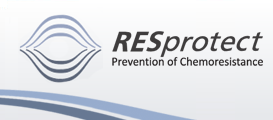| BVDU co-treatment |

|

|

|
BVDU co-treatment sensitizes for chemotherapy-induced apoptosis and inhibits chemoresistance
Rudolf Fahrig1, Jörg-Christian Heinrich1, Christina Leisser2, Georg Krupitza2, Falk Wilfert1, Christian Praha1, Denise Sonntag1, Bernd Nickel3, Beate Fiedler4, Harry Scherthan5 & Heinrich Ernst6
1RESprotect - prevention of chemoresistance, Dresden/Germany, 2Institute of Clinical Pathology, University of Vienna/Austria, 3present address: Baxter Oncology, Frankfurt am Main/Germany, 4present address: Medical School Hannover/Germany, 5present address: Max-Planck-Institute for Molecular Genetics, Berlin/Germany, 6Fraunhofer Institute Toxicology and Experimental Medicine, Hannover/Germany
During the implementation of a long-term screening program for inhibitors of induced chemoresistance, the pyrimidine nucleoside analog (E)-5-(2-bromovinyl)-2´-deoxyuridine (BVDU) was the only substance of clinical relevance we identified. BVDU co-treatment enhanced apoptosis and inhibited chemoresistance. This might have been due to the following effects of BVDU: 1) Inhibition of survival pathways and DNA repair associated enzymes. BVDU cotreatment might have promoted apoptosis by blocking the anti-apoptotic survival pathways that involve the oncogenes STAT3, JUN-D, and DDX1. Moreover, BVDU reduced the expression of the repair enzymes UBE2N and APEX to about 30% of control. 2) Induction of DT-diaphoras activity, an activator of quinone-type anticancer drugs. 3) Suppression of chemotherapy-induced Mdr1 or Dhfr gene amplification, 4) Reduced expression of ATP-generating enzymes in the recovery phase, when the cytostatic drug was omitted, but BVDU still present. The expression of nine genes increased, and that of five genes decreased. Gene products linked to microfilament formation, differentiation, and signal transduction were affected, too. In rats, co-treatment of doxorubicin (DOX), glufosfamide, or cisplatin with BVDU inhibited the growth of implanted AH13r sarcomas as well as that of dimethylbenzanthrazene (DMBA)-induced and DOX-treated fibrosarcomas and mammary adenocarcinomas. In these experiments, treatment with DOX for 50 days caused Mdr1 gene amplification and overexpression in DMBAinduced rat tumors. Co-treatment with BVDU inhibited this cytostatic drug-induced effect. In the experiments with AH13r sarcomas treate for only 20 days, no gene amplification could be observed. In in vivo experiments, BVDU reduced the non-specific toxicity of DOX, and to a lesser extent that of cisplatin and glufosfamide.
|



